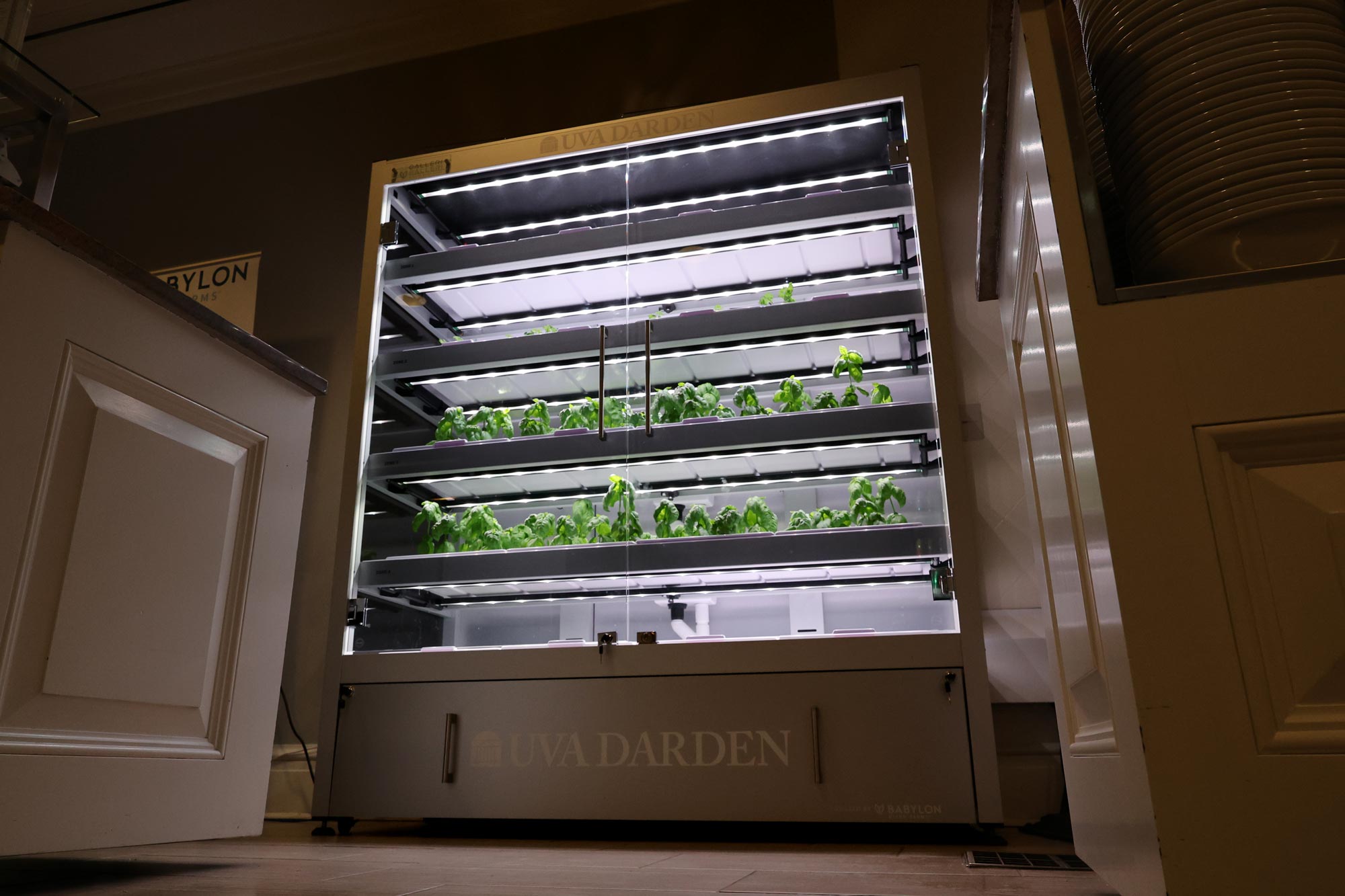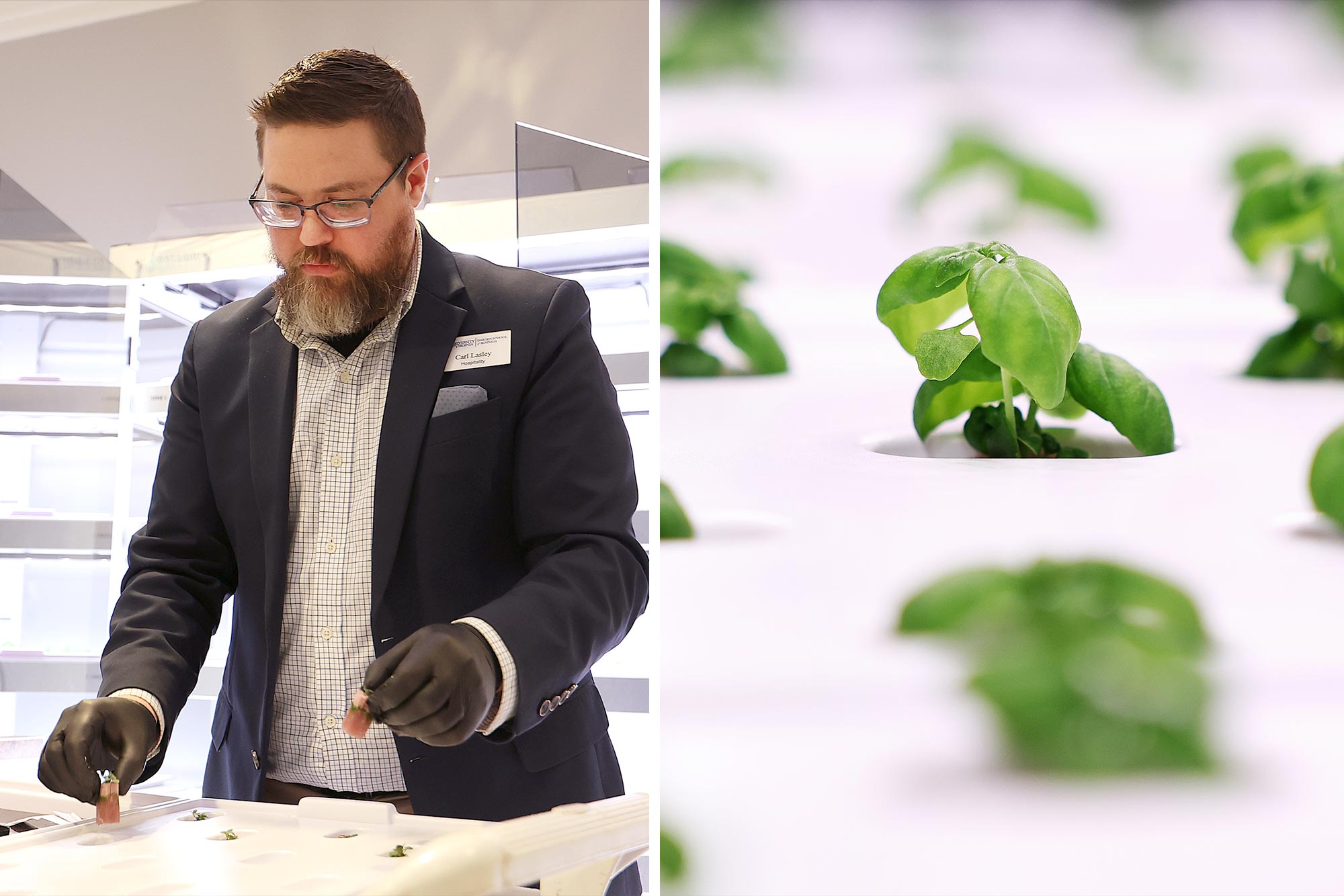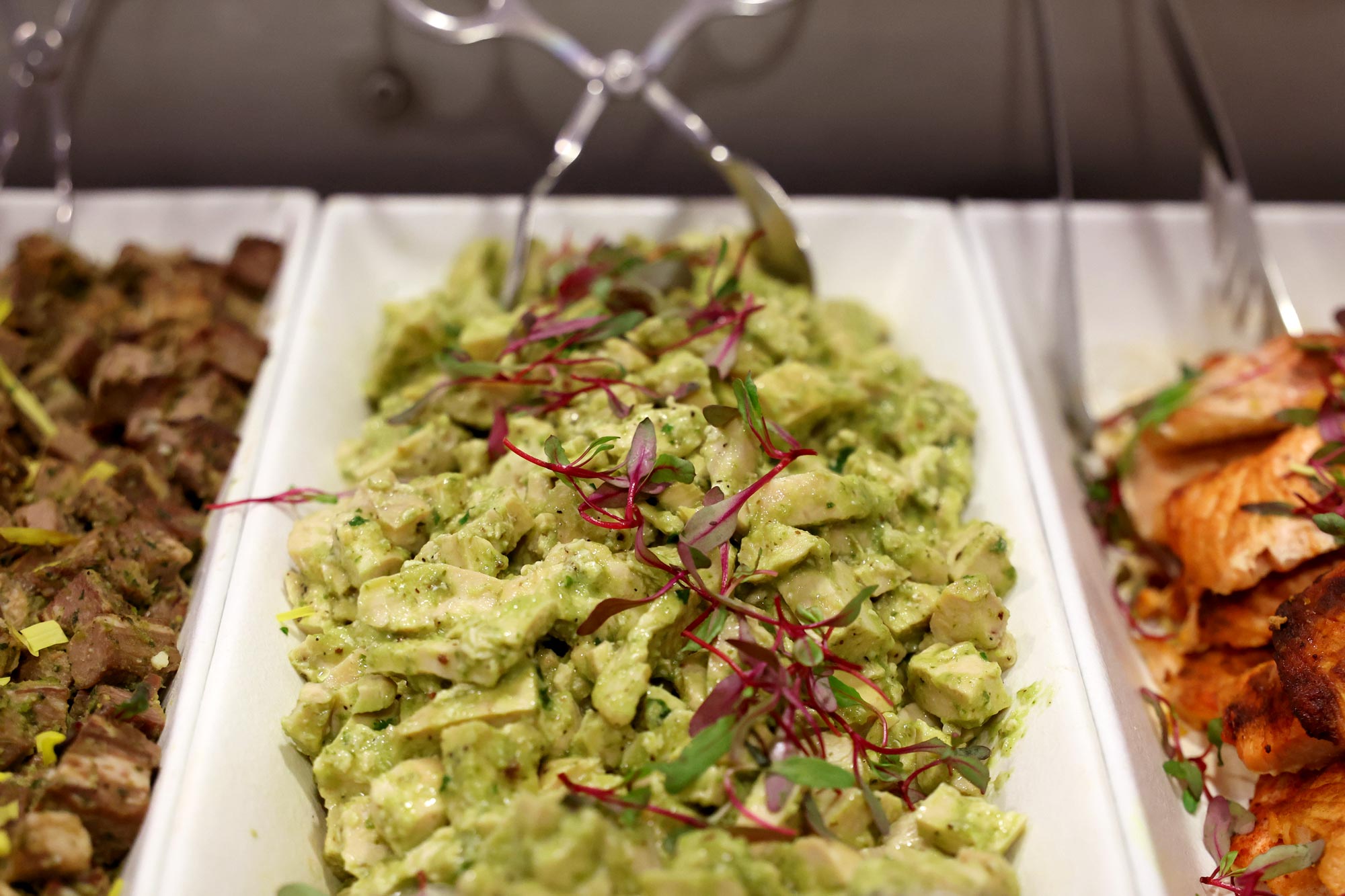
UVA Alums’ ‘Micro Farm’ Has Darden School Seeing Greens
By Matt Kelly
It’s a farm inside a kitchen.
Carl Lasley harvested basil plants, using scissors to carefully snip the aromatic herb, trimming some and completely harvesting others. The lush, richly green plants were grown in hydroponic trays in a corner of the food serving area at the University of Virginia’s Darden School of Business.
Lasley, food and beverage director at the Darden School for the FLIK Hospitality Group, which operates Darden Dining, harvested the basil from an idea that sprouted at the University and has now returned as a realized product.
While undergraduate students, Class of 2017 School of Engineering and Applied Science graduates Alexander Olesen and Graham Smith developed Babylon Micro-Farms, an indoor hydroponic growing system for greens and herbs. After graduating, they refined their business idea in the Darden School’s Batten Institute for Entrepreneurship, Innovation and Technology’s summer incubator, before firmly establishing and growing their business in Richmond.
Now Darden has installed its own Babylon Micro-Farm.
Erected in a niche of the dining hall, the unit that stands just over 6 feet tall and 5 feet wide is a talking point of sustainability at the Darden School. Babylon field technicians Ramsey Coles and Jarmel Akine installed the unit in September, working with UVA Facilities Management personnel. The metal-and-glass micro-farm is clearly visible to Darden School students.
Babylon controls the hydroponic mini-farms remotely, with the nutrients, irrigation, water pH and other variables, as well as the mini-climate, all monitored and adjusted from a computer.

A Babylon Mini-Farm, developed by two UVA graduates, allows greens and herbs to be grown in the kitchen. (Photo by Matt Riley, University Communications)
“We like to say that all of the people running one of our farms are not farmers,” Olesen said. “We are helping people grow food who really don’t have the time or the bandwidth to take up farming and learn the know-how behind it. That’s the remote management piece.”
“It’s a great representation of putting innovative ideas into action and being able to reward those students for that innovative thinking,” said Rebecca Duff, director of thought leadership for the Batten Institute. “It provides an opportunity for Darden to showcase to current students things that we’re trying to do to be more sustainable.”

Carl Lasley, left, places basil starts into the hydroponic trays in the Babylon Mini-Farm in a corner of the Abbott Dining Hall. The basil plants then grow in a carefully controlled hydroponic mixture. (Photos by Matt Riley, University Communications)
Initially, Lasley planted basil in several of the trays. Once they were established, he started parsley and oregano to fill out the array.
“We are harvesting from around 40 plants,” Lasley said “We will incorporate this basil into a vinaigrette and a chicken salad to be sold in our salad bar.”
Once the parsley and oregano are harvested, Lasley plans to plant microgreens to use for garnish on his catering and hot line. After that, the farm will lie dormant until after the winter break.
Olesen said the company sells about 40 different crop varieties for its vertical farms, from salads to culinary herbs to microgreens or flowers, all with different yields and different uses. His company has about 260 active customers in Korea, Europe and North America.
“A big part of our work now, actually, is something that we didn’t really see at the beginning,” Olesen said. “Growing the food is really half the battle. The other half is teaching people what to do with it. And there’s a real appetite for chefs and educators to grow their own food, and there are a lot of things you can do with that.”

The harvested basil was used in a chicken salad sold in the Abbott Dining Hall salad bar. (Photo by Matt Riley, University Communications)
Charlottesville native Lasley, who has operated several restaurants and has been with FLIK for two years, is not short on ideas.
“Sustainability and wholesome cooking is 100% ingrained in the ethos of FLIK, which matches my personal sensibilities,” he said. “I grew up either directly working with farmers or working for properties that had livestock and farms directly on the property where we would literally harvest the beans, go in the kitchen and cook them and serve them that night – where they would never even see refrigeration.”
Lasley, whose operation feeds between 300 and 400 people a day, may expand Babylon’s offerings in the future.
“We do have some events throughout the year that we might want some microgreens or specialty goods, and for that we can plan ahead,” Lasley said. “But until then, I think we’re going to be using the one unit that we’ve ordered for herbs for the majority of its lifespan.”
At the other end of the food cycle, the Darden School composts much of its food waste and partners with FLIK Hospitality Group to reduce waste.
The compost is sent to Black Bear Composting, which makes a cubic yard, or about 1,100 pounds, of the finished compost available to the Darden School each year for use in its gardens. The school is also committed to having 50% of the food it serves produced sustainably by 2030.
“This is a step in that direction,” Duff said.
This article was originally published in UVA Today.
The University of Virginia Darden School of Business prepares responsible global leaders through unparalleled transformational learning experiences. Darden’s graduate degree programs (MBA, MSBA and Ph.D.) and Executive Education & Lifelong Learning programs offered by the Darden School Foundation set the stage for a lifetime of career advancement and impact. Darden’s top-ranked faculty, renowned for teaching excellence, inspires and shapes modern business leadership worldwide through research, thought leadership and business publishing. Darden has Grounds in Charlottesville, Virginia, and the Washington, D.C., area and a global community that includes 18,000 alumni in 90 countries. Darden was established in 1955 at the University of Virginia, a top public university founded by Thomas Jefferson in 1819 in Charlottesville, Virginia.
Press Contact
Molly Mitchell
Senior Associate Director, Editorial and Media Relations
Darden School of Business
University of Virginia
MitchellM@darden.virginia.edu




